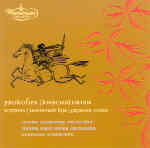Scherchen fans of a certain age will fondly recall the Prokofiev in its original incarnation as Westminster LP WL 5091, its murky brown cover depicting a fierce, fleeing horseman pursued by turquoise-colored flying beasties. That cover illustration, this time with the pursuers in red and the background a more legible mustard, will bring on fits of nostalgia, not only for the cover art but for idiomatic performances of wondrous barbarism. The Scythian Suite, salvaged from a ballet score rejected by Diaghilev, is an early work covered with fingerprints of Stravinsky’s Rite of Spring. Indeed, sections such as the opening of the “Night” episode sound like outtakes from that scandalous model. Imitative or not, the young composer produced a score whose relentless drive and brilliant orchestration should be heard more often. Scherchen launches into the opening orchestral splash like a wild man, gives the horn whoops of the final movement the piquant flavor they need, and is deliciously atmospheric in the aforementioned “Night”. The orchestra is stretched at times (that opening splash is just this side of a scramble) but Scherchen’s vivid interpretation sweeps such considerations away.
The Lieutenant Kijé Suite was written 19 years later, in 1933, the year after Prokofiev’s return to the Soviet Union. It began life as the score to a short-lived film about a bureaucratic error that results in the creation of a fictional officer by officials covering up their initial goof. The satirical target is the czarist bureaucracy, not the FBI or CIA. Fritz Reiner’s virtuoso version in resplendent sound with the crack Chicago Symphony has long been a favorite, but he’s dour alongside Scherchen, who captures the humor of the work like no one else. Each of the Suite’s five movements wears a smile–a chuckle accompanies the saucy trumpet motto, and it even infects the pompous big drum crashes at the end of “Kijé’s Wedding” and the self-important opening of “Troika”, with its bright rhythmic sparkle of sleigh-bells. Both Prokofiev works were recorded in 1951, but Westminster was considered an audiophile label in its day and despite the absence of stereo, these sound remarkably good, clearly defined and with a sense of space and atmosphere.
Nor must sonic apologies be made for the Khachaturian Gayaneh Suite, brilliantly recorded in first-class 1957 stereo. It’s drawn from a ballet about a peasant girl on a collective farm, the heroic defender of frontier settlements, and “foreign agitators”. Khachaturian, conforming to the dictates of Socialist realism, touched the right musical buttons too, grounding the music in Caucasian folk music and dances from Armenia and once-obscure places whose names end in “-stan”. The result is six movements bursting with orchestral color, rhythmic vivacity, and gorgeous melodies.
All of this is grist for the Scherchen mill, and since he was a master at elevating pop-concert standards to more dignified levels, his Gayaneh Suite is irresistible. Scherchen obviously relishes the forward momentum of the opening “Sabre Dance”, the gently rocking rhythms of the “Lullaby”, and the percussion arrays of the “Dance of the Young Kurds”. But it’s futile to cite a few of the more striking episodes because they all share his obvious belief in the music and his ability to make it grab you by the throat. And the way he shapes the “Dance of the Highlanders” and the Orientalisms of the concluding “Lezghinka” makes you wonder why it’s not as popular as the Sabre Dance.
































